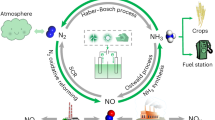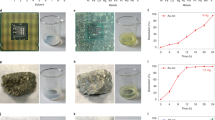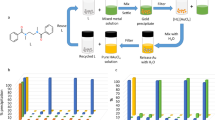Abstract
ACCORDING to Nernst's theory of electrode potentials, a very small concentration of a reactive metal should be deposited on a noble metal when the ions of the former are brought in contact with the latter. The effect is usually regarded as being too small for demonstration. Dr. G. von Hevesy showed the effect by radioactive methods some years ago. He deposited radioactive isotopes of lead and bismuth, presumably as metal, on such noble metals as platinum, gold, mercury, and copper, in some cases quantitatively; he showed, indeed, that the ions of any radio-element could to some extent be deposited on noble metals when the latter were merely immersed in a solution. The effect, I find, can be shown by some metals which are not radioactive. I have obtained it with reactive metals like uranium, titanium, tungsten, and molybdenum on such noble metals as mercury, copper, and tin.
This is a preview of subscription content, access via your institution
Access options
Subscribe to this journal
Receive 51 print issues and online access
$199.00 per year
only $3.90 per issue
Buy this article
- Purchase on Springer Link
- Instant access to full article PDF
Prices may be subject to local taxes which are calculated during checkout
Similar content being viewed by others
Author information
Authors and Affiliations
Rights and permissions
About this article
Cite this article
RUSSELL, A. Simple Deposition of Reactive Metals on Noble Metals. Nature 127, 273–274 (1931). https://doi.org/10.1038/127273b0
Issue Date:
DOI: https://doi.org/10.1038/127273b0
Comments
By submitting a comment you agree to abide by our Terms and Community Guidelines. If you find something abusive or that does not comply with our terms or guidelines please flag it as inappropriate.



